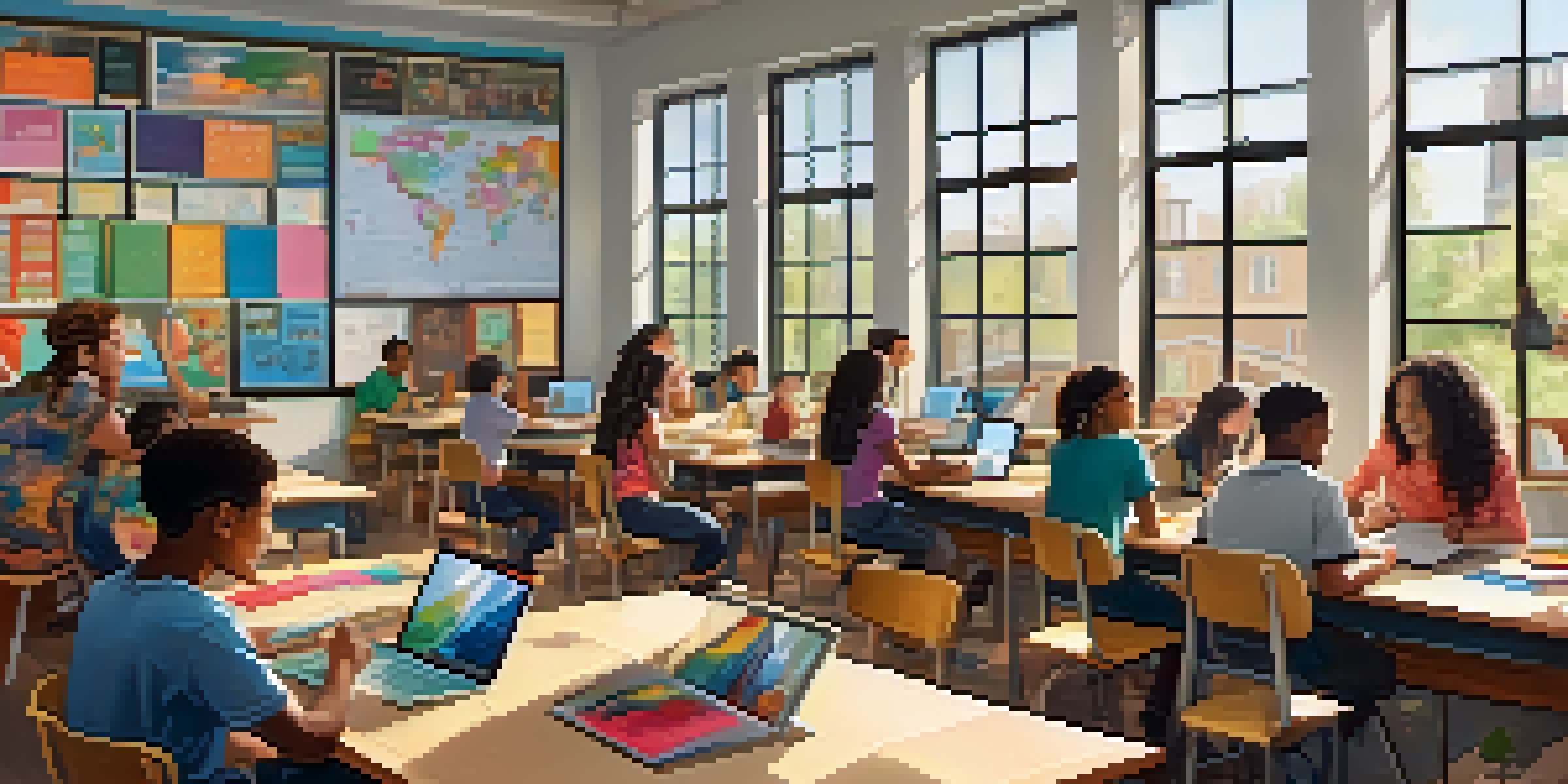Using AI to Optimize Learning Environments for All Students

Understanding AI's Role in Education Today
Artificial Intelligence (AI) is reshaping many fields, and education is no exception. It's not just about robots or complex algorithms; AI's true potential lies in its ability to analyze data and adapt to individual needs. By harnessing AI, educators can create tailored learning experiences that enhance student engagement and performance.
Artificial intelligence will transform the way we learn and teach, making education more personalized, efficient, and accessible.
Imagine a classroom where each student receives personalized resources that cater specifically to their learning style. Whether a child learns best through visual aids or hands-on activities, AI can identify these preferences and adjust the curriculum accordingly. This shift from a one-size-fits-all approach to a more customized experience is revolutionary.
Moreover, AI can help teachers identify students who may need extra support or challenge those who are excelling. By analyzing performance data, instructors can intervene promptly, ensuring that no student falls behind. This proactive approach fosters a more inclusive environment where all students can thrive.
Creating Personalized Learning Pathways
One of the most exciting applications of AI in education is the development of personalized learning pathways. These pathways allow students to progress at their own pace, ensuring they fully grasp concepts before moving on. Imagine a student struggling with a math concept; instead of feeling lost in a sea of standardized lessons, they receive targeted exercises tailored to their specific needs.

AI systems can continuously assess a student’s understanding and adapt lessons in real-time. This flexibility helps students build confidence and mastery in their subjects, as they can revisit challenging material as often as necessary. The result is a more forgiving learning environment that encourages exploration and growth.
Personalized Learning Enhancements
AI tailors educational experiences to individual learning styles, fostering engagement and mastery.
Furthermore, personalized learning pathways can also include varied resources, such as video tutorials, interactive quizzes, and gamified learning experiences. This diversity keeps students engaged and motivated, catering to different interests and learning preferences. It’s about making education not just effective, but enjoyable.
Enhancing Collaboration Among Students
AI doesn't just support individual learning; it can also enhance collaboration among students. Through AI-driven platforms, students can work together on projects and assignments, sharing their insights and skills. This collaborative spirit mimics real-world scenarios, preparing them for teamwork in their future careers.
Education is the great equalizer, and technology can help ensure that every student has the opportunity to succeed.
For instance, AI tools can facilitate group discussions by suggesting topics based on individual contributions, ensuring that everyone has a voice. These platforms can analyze group dynamics and encourage quieter students to participate, fostering a more inclusive atmosphere. The end goal is to build not just knowledge, but also essential social skills.
Additionally, collaborative AI tools can help track group progress and outcomes, providing valuable feedback to both students and educators. This transparency allows teachers to adjust their teaching strategies to better support collaborative efforts, ensuring that every student benefits from shared learning experiences.
Utilizing Data to Support Educators
Data is often referred to as the new oil, and in education, it can be a powerful tool for improvement. AI can process vast amounts of data quickly, providing educators with insights into student performance and behavior. This information is crucial for identifying trends and making informed decisions about curriculum and teaching methods.
For example, if a particular topic consistently poses challenges for students, AI can highlight this pattern, prompting educators to modify their approach. By focusing on data-driven decision-making, schools can create a more effective learning environment that continuously evolves based on student needs.
Collaboration and Inclusivity Boost
AI promotes teamwork among students while ensuring inclusive support for all learners.
Moreover, AI can also help streamline administrative tasks, freeing up educators to focus more on teaching. From grading assignments to managing schedules, AI can handle repetitive tasks efficiently, allowing teachers to spend more quality time with their students.
Fostering Inclusivity Through AI Solutions
Inclusivity in education is essential, and AI can play a significant role in ensuring that every student receives the support they need. For students with disabilities, AI tools can offer personalized assistance, such as speech-to-text applications or customized learning aids. This technology empowers students to engage fully with the curriculum.
Additionally, AI can help identify and address potential barriers to learning before they become significant obstacles. For instance, if a student is struggling with reading comprehension, AI can recommend targeted interventions that cater to their unique challenges. This proactive approach promotes a culture of support and understanding.
As schools strive to create environments where all students feel valued, AI can be a game-changer. By breaking down barriers and fostering inclusivity, educators can ensure that no student is left behind, creating an equitable learning landscape for everyone.
Preparing Students for a Tech-Savvy Future
As we navigate an increasingly digital world, preparing students for future challenges is vital. AI in education not only enhances learning but also equips students with essential tech skills. By interacting with AI-driven tools, students become familiar with technologies that are likely to shape their future careers.
These experiences can range from coding exercises to using AI for research projects. Such exposure fosters critical thinking and problem-solving skills, encouraging students to become creators rather than just consumers of technology. In this way, AI helps cultivate a mindset geared toward innovation and adaptability.
Data-Driven Improvements for Educators
AI analyzes performance data, enabling educators to make informed decisions and streamline administrative tasks.
Furthermore, understanding AI and its capabilities positions students to enter a workforce that increasingly relies on this technology. Whether they pursue careers in tech or other fields, the skills gained through AI-enhanced education will be invaluable in navigating the complexities of modern jobs.
The Future of AI in Learning Environments
Looking ahead, the integration of AI in education is poised to grow even further. As technology advances, the tools available to educators will become more sophisticated and user-friendly. This evolution will likely lead to even more effective ways to engage students and enhance their learning experiences.
Moreover, the ongoing collaboration between educators, technologists, and policymakers will shape how AI is implemented in classrooms. Open discussions about ethical considerations, privacy, and access to technology will be crucial for ensuring that AI serves the best interests of all students.

Ultimately, the future of AI in education is bright, with the potential to create more dynamic, inclusive, and effective learning environments. By embracing these changes, educators can unlock new possibilities for student success, preparing them for a world that is ever-evolving.